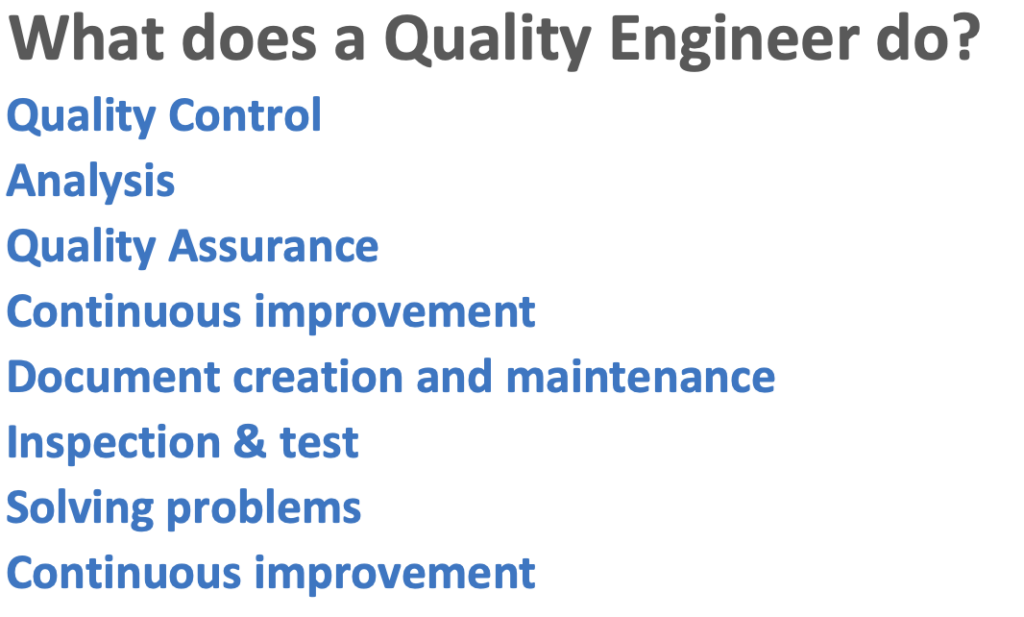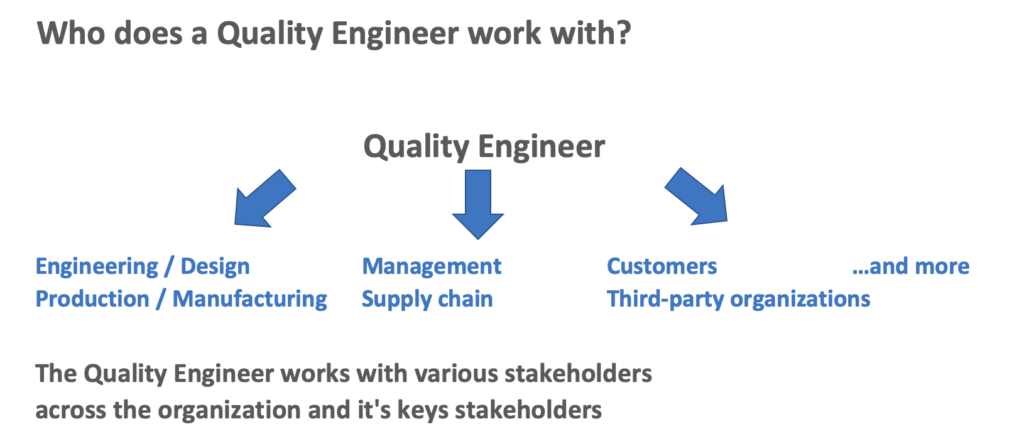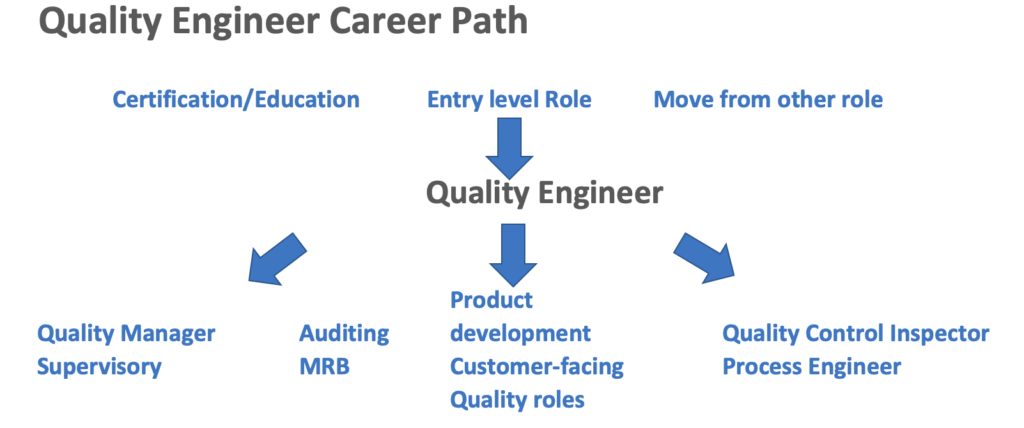
In the constant push for a quality product and efficient and effective processes, ongoing quality checks and product validation is a must.
These steps ensure that your organization maintains both high quality and consistent output.
One of the key facilitators of this is the Quality Engineer.
In today’s article, we’ll be looking at the role of the humble Quality Engineer and their importance within the organization.
In this article you’ll learn:
- What is a Quality Engineer
- What does a Quality Engineer do?
- Who does a Quality Engineer work with?
- How to be a Quality Engineer
- What is a Supplier Quality Engineer
- What makes a good Quality Engineer
OK, Let’s do this thing!
What is a Quality Engineer
Found across a wide variety of industries, Quality Engineers undertake a variety of functions and play a key role in driving quality within an organization.
A Quality Engineer can best be described as an umbrella role which has a group of common tasks; however, the importance of each may vary between industry.
The Quality Engineer role can vary significantly from one organization to another.
For example, some Quality Engineer roles may focus more on production support; some may lean more towards QMS control and record-keeping; some may have a different focus.
In many organizations, the critical task for a Quality Engineer is supporting production.
In reality, this means fixing issues when they arise and using analysis to help ensure processes are efficient and effective.
QE’s usually work within or with delegated authority from the quality function; however, they are often embedded within different facets of the organization (i.e., production).
This provides a quality focus within that function, aiming to ensure that the quality of the products being produced remains sustainably high and resolving quality-related issues rapidly when they arise.
What industries to Quality Engineers work in?
Broadly speaking, QE’s work across both Manufacturing and Service orientated business.
You’ll find them across a wide range of industries from Aerospace to Pharmaceuticals, from Manufacturing through to Service orientated businesses.
What does a Quality Engineer do?
Quality Engineers tend to have three core goals: they:
- Ensure Products that are manufactured meet customer expectations
- Ensure Products that are manufactured are safe
- Ensure Products that are made have an effective, repeatable production process.
This will typically include:
- Creating & Maintaining records
- Problem-solving
- Defining testing/acceptance criteria & testing products against these
- Continuous improvement
- Corrective & preventative actions

As we all know, processes determine the output and ultimate standards of a business. The Quality Engineer helps play a key enabling role with this.
The role of Quality Engineer is based around a basic framework of key tasks and responsibilities. However, you will find the detail varies from one organization to another.
This variation is typically driven by two facets:
1/ Size of organization
2/ Type of industry (i.e., Aerospace/ Pharmaceutical for example)
In larger organizations, you may find that the Quality Engineer may work as part of a larger team and has specific areas of focus. This could include
- Quality Control
- Analysis
- Quality Assurance
- Continuous improvement
- Document creation and maintenance
- Inspection & test
- Solving problems
- Continuous improvement
Larger organizations may have specific QE’s for some of these tasks.
In smaller organizations, Quality Engineers are likely to face a broad range of tasks supporting the overall quality system and have a broader range of responsibilities.
Let’s look at a few of these in more detail:
a) Quality Assurance
Perhaps the key role is that of Quality Assurance. Quality Assurance focuses on maintaining the required level of quality within a product or Service.
Quality is typically very process-focused, targeting standardization, removing variation, and the likelihood of defects.
The role of the Quality Engineer, therefore, becomes one that is tightly woven in with the Quality Management System.
QE’s find themselves engaging with the production process, and the business production processes identified within the quality system ensure that they can fulfill requirements.
This might be achieved via several quality assurance tools, including measurement and analysis, auditing, process control & review.
These tasks clearly require deep product and process knowledge, and many QEs require a specific level of Engineering knowledge in order to do this.
b) Analysis & Process Improvement
Quality Engineers will often employ process improvement tools & techniques to help maintain or improve output.
The improvement tools that are used can vary between organizations but are often built on a common quantitative toolset.
This often includes tools like value stream mapping, kaizen, fishbone analysis, 5s, and Pareto are all common.
Much of these improvement tasks will be to drive change in the quality of a given process. Quality Engineers typically achieve this through:
- Minimizing variability
- Identifying potential process waste
- Removing potential causes of defects.
c) Creating & Maintaining documentation
Quality Engineers will encounter and process a wide range of documents in their workplace.
These will include:
- Manufacturing Records
- Technical requirements/product design
- Reports
- Processes & procedures
- Change orders
- Non-conformance reports
- Specifications
They will take a proactive role in the creation and maintenance of many of these types of documents, either creating it themselves or liaising with the stakeholders that do.
They will also consume many of these documents within the execution of their role. I.e., they may use technical specifications in the development of processes.
Where they are not responsible for the creation of the document, they may have a governance/review role in the processing of the said document. Therefore the ability to comprehend and process in a timely fashion important pieces of information is of key importance.
Whatever the organization, Quality Engineers are a key driver behind the success of the overall quality function, working to ensure that the business processes & systems facilitate the delivery of a final product that meets both internal & external customer standards.
Who does a Quality Engineer Work With?
The role of a Quality Engineer is a supporting one in such that you are likely to work with a variety of stakeholders in optimizing and sustaining production. It is far-reaching, you are likely to find yourself working stakeholders from across your organization, including:
- Engineering / Design – Supporting life cycle management of the design, testing, reviewing problem points.
- Production / Manufacturing
- Management
- Supply chain
- Customers – liaising with customers, supporting the resolution of reported issues.
- Third-party organizations – Auditors, suppliers,
A key attribute, therefore, of a quality engineer is their communication skills and their ability to relate to a wide range of functions and levels within an organization.

How to become a Quality Engineer
When it comes to starting out as a Quality Engineer, there are usually three key aspects that drive the entry-level.
1) Educational standard
- A suitable degree level education (often an Engineering led degree) is a common requirement
- Understanding of manufacturing systems & processes
- Certification
When it comes to certification, the American Society of Quality offers a great route with a Quality Engineer certification.
2) Key skills
- Teamwork
- Problem Solving
- Analytical skills
- Process development
- Communication skills
- Technical competency (often attributable to a particular industry).
3) Experience
Where an individual may have extensive experience in a particular field, i.e., production, it is not uncommon for organizations to see these staff cross-train and migrate their roles and develop into quality engineers.
What makes a good Quality Engineer
Given the role is multi-faceted, there is not one particular feature that stands out that drives excellence.
Given this, Quality Engineers should focus on attributes that improve core competencies such as:
- Communication
- Problem-solving skills,
They should also look to enhance:
- Product Knowledge
- Process Knowledge
- Analytical skills
- Team skills
- Ability to innovate
How much does a Quality Engineer get paid?
Quality Engineer salaries can vary depending on several factors which typically include:
- Industry
- Size of organization
- Location
- Candidate experience
At the time of writing (May 2020), the salaries for a basic Quality Engineer in the UK typically range between £35-£45k per annum or $55-70 USD.
These salaries, however, can vary considerably depending on a range of factors and the salaries given above should be used as guidance only.
Career path for Quality Engineer
As this article has discussed, Quality Engineers can have far-reaching responsibilities that can help in career advancement.
Given the overlap with Engineering, there appears to be plenty of opportunity for QE’s to migrate to engineering-based roles, particularly in the realms of product development (given their levels of product & process knowledge).

Here’s our list of possible career paths for Quality Engineers:
- Quality Manager
- Supervisory roles within the Quality Function
- Auditing
- MRB
- Product development
- Customer-facing Quality roles
- Quality Control Inspector
- Process Engineer
If you’re already a Quality Engineer and looking to transfer between industries, be sure to research the entry requirements. Just because you’re a QE in one industry doesn’t mean that just because core skills are shared that you can automatically become one in another. Experience, as ever, is key.
The question you’re probably thinking is, how long does it take me to progress?
That depends on a lot of things, and no individual, industry will likely see the same career progression. The best thing to do is consider what fields are open to you and develop your own plan discussing this with your line manager or HR team.
Given there wide and varied use, demand for QE’s is typically high.
Transferring between industries (Aerospace to Pharma, for example) can be challenging but is not impossible.
Becoming a Quality Engineer
If you’re looking at becoming a QE and you’re wondering how to get started you have a number of options:
a) Qualifications – As we described above, one of the swiftest ways of getting into the market is via an appropriate qualification. If it’s open to you, get certified. Where you can get qualified in an appropriate engineering based discipline.
b) Get started with Entry level positions. Entry-level positions can offer you a great in-road. Obviously, the starting salaries should be considered, but if you’re just starting out, your probably looking to grow your experience and need to set your expectations at the right starting position.
c) Grow your on the job experience
If you’re in a role where you can grow your experience picking up key skills that benefit a QE position, then you should take that opportunity. When QE roles come up, being able to demonstrate that you have many of the skills required may get you that starter position.
Summary
The role of Quality Engineer can offer a rewarding and fulfilling career. It acts at the heart of the business and plays a key role in its success.
There are numerous entry levels, a competitive salary, and several exciting career paths.
Are you working as a QE? Have you built your career from being a QE? Have some comments on this article? We’d love to hear from you in our comments section below.
